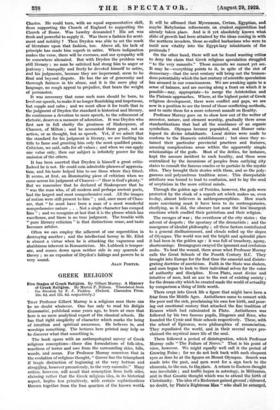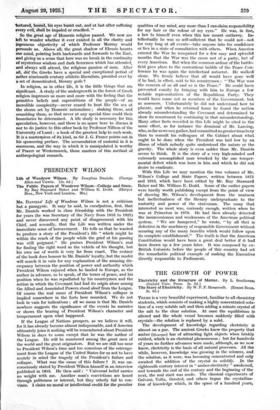GREEK RELIGION
Five Stages of Greek Religion. By Gilbert Murray. A History
10s. 6d. and 12s. 6d. respectively.)
THAT Professor Gilbert Murray is a religious man there can be no doubt whatever. One has only to read his Religio Grrammatici, published some years ago, to learn at once that here is no mere analytical expert of the classical schools. He
has that right simplicity of character which marks the being of intuition and spiritual awareness. He believes in, and worships something. The lectures here printed may help us to discover what that something is.
The book opens with an anthropological survey of Greek religious conceptions—those dim formulations of folk-idea, reactions of terror and awe from the surrounding skies, hills, woods, and ocean. For Professor Murray conceives that in the evolution of religious thought, " Greece has the triumphant if tragic distinction of beginning at the very bottom and struggling, however precariously, to the very summits." Many critics, however, will assail that conception from both sides, claiming rather that the Greek religious idea, in its historical aspect, begins less primitively, with certain sophistications thrown together from the four quarters of the known world. It will be affirmed that Mycenaean, Cretan, Egyptian, and maybe Babylonian refinements on crudest superstition had already taken place. And is it yet absolutely known what state of growth had been attained by the ideas coming in with the northern invaders, those so-called barbarians who were to instil new vitality into the Egypt-lazy inhabitants of the peninsula ?
On the other hand, there will not be found wanting critics to deny the claim that Greek religious speculation struggled " to the very summits." Those summits we cannot yet see. It may be—everything points to it, in spite of the riot of democracy—that the next century will bring out the tremen- dous potentiality which the last century of scientific speculation has aroused in our consciousness. We are awaking again to a. sense of balance, and are moving along a front on which it is possible—nay, appropriate—to merge the Aristotelian and the Platonic approaches. Where, at the highest point of Greek religious development, there were conflict and gaps, we are now in a position to see the trend of those conflicting methods, and to unite them for a more coherent assault on Reality.
Professor Murray goes on to show how out of the welter of ancestor, nature, and element worship, gradually there arose standardizations that had all the semblance of an organic symbolism. Olympus became populated, and Homer cata- logued its divine inhabitants. Local deities were made to conform to the Homeric establishment ; but since they re- tained their particular provincial practices and features, amazing complications arose within the apparently simple relationships of the gods. Most of the deities, for instance, kept the amours incident to each locality, and these were centralized by the incursions of peoples from outlying city states to consult the famous oracles or to partake in the mystic rites. They brought their stories with them, and so the poly- gamous and polyandrous tradition arose. This disreputable attribute was bound to lead to confusion, and to lay the seed of scepticism in the more critical minds.
Through the golden age of Pericles, however, the gods were protected by the cloak of a superb art which makes us, even to-day, almost believers in anthropomorphism. How much more convincing must it have been to its contemporaries, clarifying, as it did, the obscure but none the less' insurgent emotions which cradled their patriotism and their religion.
The ravages of war ; the overthrow of the city states ; the advent of despots ; the apostasy of the dramatists ; and the emergence of idealist philosophy ; all these factors contributed to a general disillusionment, and clouds rolled up the slopes of Olympus. The world was not the bright and splendid place it had been in the golden age : it was full of treachery, agony, shortcomings: Demagogues swayed the ignorant and credulous mobs. To heal the wound, there arose what Professor Murray calls the Great Schools of the Fourth Century B.C. They brought into Europe for the first time the unsocial and disinte- grating doctrine of asceticism. Faith in the State was shaken, and men began to look to their individual selves for the voice of authority and discipline. Even Plato, most divine and intuitive of men, laid an axe to the root of existing society ; for the dream city which he created made the world of actuality by comparison a thing of little worth.
There crept into Greek life a figure that might have been a friar from the Middle Ages. Antisthenes came to consort with the poor and the sick, proclaiming his own low birth, and pour- ing out emotional oratory that attacked the fine tradition of Reason which had culminated in Plato. Antisthenes was followed by his two famous pupils, Diogenes and Zeno, who founded the Cynic and Stoic schools respectively. These, with the school of Epicurus, were philosophies of renunciation. They repudiated the world, and in their several ways pro- claimed the mystical inner life of the soul.
There followed a period of disintegration, which Professor Murray calls " The Failure of Nerve." That is his point of view, however. We might equally well call it the period of Growing. Pains ; for we do not look back with such eloquent eyes as does he at the figures on Mount Olympus. Search was made into the past, and Igen went for a sign back to the elements, to the sun, to thq pt.ars. A return to Eastern thought was inevitable ; and traffic began in astrology, in Mithraism, and in that Gnostic thought which was to attend the birth of Christianity. The idea of a Redeemer gained ground ; coloured, no doubt, by Plato's Righteous Man " who shall be scourged,
tortured, bound, his eyes burnt out, and at last after suffering every evil, ihall be impaled or crucified. "
So the great age of Homeric religion passed. We now are left to wonder whether it ever existed in all the clarity and ingenuous objectivity of which Professor Murray would persuade us. Above all, the great shadow of Eleusis haunts CHIT mind, pointing both backwards and forwards to the East, and giving us a sense that here was no break in the continuity of mysterious wisdom and dark fierceness which has attended, and always will attend, the religious passion of man. After all, did the Greeks have a special and exceptional period of rather nineteenth century athletic liberalism, presided over by a set of domesticated, literary gods ?
In religion, as in other life, it is the little things that are significant. A study of the undergrowth in the forest of Greek religion impresses us more and more with the feeling that the primitive beliefs and superstitions of the people—of an incredible complexity—never ceased to beat like the sea at the shores set by Homeric rationalism ; shaking them, and crumbling them, so that never at any special time could their boundaries be determined. A life study is necessary for this speculation, however, and there is no space here to discuss it nor to do justice to this other book by Professor Nillson of the University of Lund ; a book of the greatest help to such work. It is a masterpiece of its kind, as Sir J. G. Frazer points out in his sponsoring preface. The accumulation of material in it is enormous, and the way in which it is manipulated is worthy of Frazer or Westermarck, those masters of this method of anthropological research.



































 Previous page
Previous page